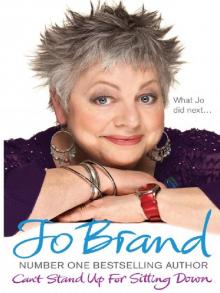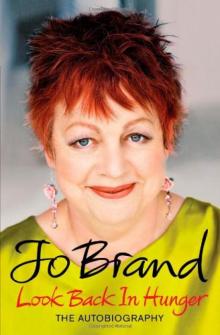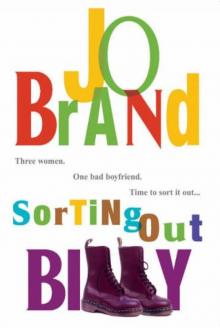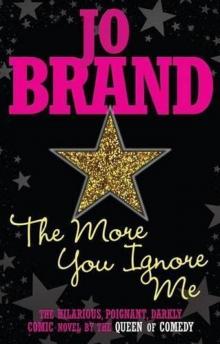Look Back in Hunger Read online
Page 21
Having done a few try-out spots between my second gig and Christmas, I finally arrived at my first booking at the Gate Theatre. By this time I had had an opportunity to hone my new material, chuck out the dead wood and write a bit more, but I was still slightly anxious as I drove up to Notting Hill, because here was another milestone—a gig I had ACTUALLY BEEN ASKED TO DO.
Each time something new happened in my comedy career, it was an opportunity to learn something, and I learned a very important lesson at the Gate Theatre.
I was waiting backstage to go on and heard the compere announce my name and the audience start clapping. In a panic, I realised I didn’t know how to get on to the stage, rule number one, surely, in the stand-up comic’s manual. Blindly, I ran around in the dark. Edging closer to where the applause was starting to die out to a smatter and seeing no slit in the dark curtain, I dived underneath and came out the other side … on stage. The audience, seeing me crawling out from under the curtain at the back of the stage, pissed themselves laughing, so I had to pretend I’d done it deliberately. I sauntered as nonchalantly as I could up to the mic … and then couldn’t get the bloody thing off the stand. I got so desperate that eventually I forced it out and broke the clip— another big laugh.
I decided I could not go on having the technical ability of a three-year-old and should take on board some stage nous double-quick.
CHAPTER EIGHTEEN
SITTING IN CARS WITH FUNNY PEOPLE
As my comedy career started to stagger forwards bit by bit, I was still trying to hold on to my job at the emergency clinic. In lots of ways, the nursing job on its own was stressful enough and I found it hard to fit the gigs in around the proper job. Once I had been going for about six to eight months, doing small gigs round London, I started to get work outside the metropolis and that involved seriously long drives, say to Nottingham, to do a show and then back the same night and maybe an early shift at 7.15 the next morning. I was beginning to get bloody exhausted.
By this time, I had bought a flat with a friend, Sue, and so more than ever needed some sort of steady income to pay the mortgage, and what I got from my comedy wasn’t quite enough.
I also had to fit a rather hectic social life into all this, as there were numerous parties to go to and a life to lead. Occasionally I would do extremely stupid things. I could make the excuse that this was down to tiredness, but mainly it was down to me being an arse.
One night, very drunk, I drove back from a party with a few people in my little car. When we got to the flat where I lived with Sue, a thirties’ block, in order to entertain the people in the car, I drove on to the middle of the ornamental garden and raced round and round it, all of us hysterical with laughter. What I had not realised was that a police van had followed us up the hill, seen me go through some red lights and followed the car to the flats. I was blissfully unaware of this and the copper just sat in his van and watched as I drove everyone round and round the garden. When I eventually parked up and we began to get out of the car, the policeman strolled over and asked whether I’d been drinking. The problem was that I’d got to that bolshy stage of couldn’t-give-a-toss, so rather than trying to play it down and get myself out of trouble, I upped it. ‘I should say so,’ I replied cheerily.
He breathalysed me and said that I was way over the limit and would have to go to the station, at which point I remarked, ‘It’s a fair cop.’ (Yes, very unoriginal, I know.)
At this point, thankfully, Sue intervened and explained that I was the senior sister at the emergency clinic, I’d had a very stressful week, I’d never done anything like this before and I was very sorry and wouldn’t do it again. Amazingly, the policeman turned to me and said, All right, get inside before I change my mind.’ I did.
The following week, during a particularly busy day at work, a policeman wandered up to the front desk and said ‘Remember me?’ I didn’t, but he was in fact the copper who had nearly arrested me, just checking that I was who Sue had said I was. I was a big supporter of the police that week.
I was being given more responsibility at work and a few times a month I was actually allowed to be in charge of the entire hospital, which rather surprised me. I must admit I tend to deal with pressure like that by ignoring it. So I never felt too anxious, although one worry was that someone would die in the hospital while I was in charge, because although I knew what I should do in theory, I had never actually put it into practice and hoped I would never have to. I didn’t.
One day, the night charge nurse turned up quite obviously pissed. He smelled of drink, his speech was slurred and I immediately phoned my senior, who agreed to come in. We both assessed him as pretty drunk and he was asked to go home while cover was found.
What upset me about this was that when some disciplinary action was taken, he asked the union rep to be present with him and, even though we knew each other well, the union rep seemed to be implying that I was racist, because the guy was black and I didn’t understand the cultural differences between white and black drinking. What a load of bollocks! I am a big supporter of unions, but I think occasionally they do themselves a disservice. This kind of thing dilutes the seriousness of genuine cases of racism, of which there are quite a few in large institutions.
These sorts of situations made me feel even more demoralised at work. It was a very unwieldy place that was no doubt difficult to run, and it was starting to get to me a bit. I was gradually getting more stand-up bookings and was beginning to feel that if I stayed much longer I would have no choice but to become as institutionalised as the long-serving members of staff. I decided that soon there would have to be a cut-off point when I would risk letting go of my massive nursing salary and take a chance on comedy.
Much of my early comedy act revolved around my weight. This was for a few reasons. First of all, I knew it was the first thing people would notice about me when I stepped on stage. Secondly, it was something that some individuals in the street thought was obligatory to comment on, and I wanted some right of reply. Thirdly, I thought that if I tackled the issue in a self-deprecating way, it would fend off the worst of the hecklers in the audience. Also, if I got that out of the way and had the audience on my side, then I’d be free to tackle other topics that were perhaps more difficult for some of them to swallow, like having a go at men, for example.
So some of my early jokes about my weight were:
‘I was the child who was asked to play Bethlehem in the school nativity play.’
‘I went to a health farm, ended up eating my bedroom.’
‘I went on the pill when I was sixteen and put on four stone, so that proved to be a very effective contraceptive.’
I tended to write what I would call very spare material. There was no padding at all, and because I was nervous, not a natural performer and probably not a good public speaker either, I’d keep my lines short and simple rather than digress. At the beginning of my career, I learned everything word for word and repeated it parrot-fashion, and I found it excruciating if I was forced to stray from my prepared material. Everyone thought I had a weird style because I delivered stuff in a world-weary monotone. This wasn’t deliberate; it just happened because I had no idea how to deliver jokes and my nervousness made my voice sound like that.
One thing I found absolutely amazing was the first time I saw my name printed in the listings mags—Time Out and City Limits. I sat and stared at it for ages and couldn’t quite believe it was there. I felt a mixture of pride and wonder and was gobsmacked that I was on the road to achieving something.
I particularly loved City Limits, the listings magazine that is no longer with us. It was well known for misprints, and sometimes they inadvertently hit the nail on the head. I remember their listing for an all-female stand-up show. The headline at the top announced an ALL WOMEN SHOW!’ And underneath the names were listed:
Jenny Lecoat
Donna McPhail
Hattie Hayridge
Jo Brand
Bernard Gilho
oly
‘Bernard’ Gilhooly was, of course, Brenda Gilhooly, an utterly charming, friendly and delightful stand-up whose path I crossed many times on the circuit and who became a good friend. She did straight stand-up for a while and then developed a very funny character called Gayle Tuesday, an ex-Page Three model. She now works with Harry Hill and, as we both have families, our busy lives dictate that we don’t see each other as much as we’d like.
There was also another brilliant misprint about Brenda which was quite prescient considering the character she ended up doing. City Limits used to abbreviate certain words to give you a flavour of what the comic was like, and one of their favourites was ‘sexpol’—i.e. sexual politics. Once while trawling the listings, I saw ‘Brenda Gilhooly (sexpot)’. Not quite the effect City Limits intended.
The comedy I performed early on was deliberately designed to shock. This is because I’ve never been a fan of euphemism. I’ve always liked to tell it like it is. I find that genteel, slightly middle-class attitude that calls, for example, dying ‘passing away’ or having a mental illness ‘a breakdown’ very irritating. And I think there are far too many euphemisms in the whole area of bodily functions. It is the British disease and probably the reason we all have such a weird attitude towards sex and toilet subjects. If you look at traditional comics, their jokes were peppered with euphemisms, but the meaning underneath was very clear to everyone, so why not just say it? I think women are made to feel ashamed of having periods, for example. In some cultures, women are sent away from society for the duration of their periods, for God’s sake. So I wanted to say it like it was.
Hence: ‘Lots of people use euphemisms for periods, because it’s embarrassing, like “I’ve got the painters and decorators in” or “Arsenal are playing at home”. I prefer “I’ve got a vast amount of blood squirting out of my cunt, Vicar”.’ I used to finish my set with that, and I can see why some people fainted (only kidding).
In my first year of stand-up, I did quite a few ‘open spots’ in all the clubs around London. On the whole they went well and I can’t remember any huge disasters. I worked with a wide range of different comics who were around at the time: Julian Clary—no different from how he is today; Eddie Izzard—absolutely terrible when he started, just not funny. In fact, poor old Eddie, it became a standing joke: ‘Eddie’s died again.’
And then one night, at the Red Rose Labour Club, we were steeling ourselves for Eddie to have another nightmare, feeling sorry for him because we all liked him, and, out of the blue, he absolutely stormed it. The crowd went mental, gave him an encore and he never looked back. It was interesting because he hadn’t changed his material much, but he’d somehow shifted the emphasis of his delivery slightly and added a bit more of a surreal touch to it. Such is the very thin line between funny and dreadful.
Frank Skinner was the same. I first saw him at a club in Birmingham soon after he’d started and he really struggled. I had him down as a no-hoper and yet when I saw him a few months later, he had found a way of delivering that worked and the audience loved him.
Other comics floating around at that time were Mark Thomas, Rob Newman, Dave Baddiel, Hattie Hayridge, Harry Hill, Al Murray, Alan Davies and Mark Lamarr, all of whom were really good stand-ups. My favourites at the time were Nick Hancock and Lee Cornes. We all used to love Hancock’s set, to the point that we knew much of it by heart and would mouth it along with him at the Comedy Store.
Lee Cornes, who never really went mega (I don’t know why because he was brilliant), ended up playing a science teacher in Grange Hill. His act was a lesson in taking the piss. He was once compering at the Comedy Store and he did exactly the same material in the second half as he’d done in the first, just to see how long it would take for the audience to complain.
Nick Hancock and I, along with an act called the Teddy Bear Torturer, did a gig in far-flung Barnstaple in Devon, in a local nightclub—a totally unsuitable venue. Because we were well on time, probably even early, once we crossed the county border into Devon, we decided to stop at every pub en route and have a drink. I think we managed about twelve.
By the time we got to the gig, we were completely rat-arsed. The show was terrible. We were separated from the audience by the dance floor and it felt like a stand-off rather than a stand-up comedy gig. Nick ended up taking off his shoes and throwing them at a couple of hecklers and when it was my turn, I was so pissed I started crying and refused to go on. Some sensible fellow ignored my wimpishness and just pushed me on to the stage, whereupon I probably performed the worst, most unintelligible set of my life to quite a lot of pointing and booing. Happy days.
Sometimes work could be very lonely. I was once sent up to a gig in Tamworth on my own. In those days there was no glamour attached to gigging, no posh hotels or tour manager or driver. I was booked into a pub for the night and when I walked into the bar everyone turned round and stared at me like I was an alien from another planet. The woman behind the bar gave me a key to a very dingy room with just a bed and a bedside table. She said, ‘You’ve got to be back by eleven or we’ll lock you out.’
Mmm, what a friendly welcome. I did the gig, which was shit, in a church hall full of people who looked like they’d rather be at a Tory Party knees-up. I got back to the pub at five to eleven, bought seven bottles of Pils, poured them down my neck one by one and slipped into a stupefied sleep. I have never been so depressed in my life.
One of my favourite nights ever was when I was booked to do a gig at the Institute of Contemporary Arts in central London. The place had a slight reputation at the time of being up itself and what happened on the night I worked there seemed to support that.
While I was on stage, a patient I’d known for a long time, who really wasn’t very well at that point, turned up and stood at the back, stark naked, holding only a mobile phone and talking to someone on a far-off planet. What was amazing was that nobody batted an eyelid. I don’t know if they assumed he was a moving piece of art or a waiter or what, but they just let him get on with it.
It was pure coincidence that he was there and he didn’t really seem to notice it was me on stage. I made a decision not to intervene at that point. I knew I couldn’t manage him on my own, knew he wasn’t violent, so I just called his ward and they followed it up and had him back by late that night.
I did eventually get round to doing Jongleurs, and it wasn’t a happy evening. I was booked to do the whole weekend and on the Friday night found myself in front of a rowdy crowd containing lots of drunks, including a table of dentists on a stag night. And anyone who thinks that dentists are better behaved than those in less elevated jobs had better think again. These guys were completely out of control and I found myself parrying the normal ‘Fat slag’ and ‘Get your tits out’ type heckles. And then one of them got on the table, unzipped his trousers and lobbed out his flaccid penis with the words, ‘Suck my cock, you fucking bitch!’ Well, I felt this was beyond the call of duty. So at that point, having done my best, I departed the stage and left them to get on with it.
I foolishly expected the club owner to sympathise with me a tiny bit, but instead he looked at his watch and ticked me off because I had come off stage three minutes early. Once again I invited someone to stuff their job … yes, you know where it’s going, I’m sure. And I’ve never worked at Jongleurs since.
I spent quite a long time in 1987 sitting in a car on the motorway. At the time, a lot of comics didn’t drive and we weren’t earning enough to have a driver, so rather than get the train or some hideous coach that made its way round half the country before arriving at the destination, I tended to drive everyone. At least this meant we could all be back home the same night. And most of the time I was working the next day anyway. I must have been absolutely mad, thrashing it up and down the M1 most nights, but at the time it seemed the only way to do it.
One day I had a gig in Nottingham with Bob Mills, Johnny Immaterial and Mandy Knight. You may not have heard of any of these comics, whic
h I find weird, because they are all very funny individuals. I think people assume that the best comics will inevitably make it into the public eye in some way. This is not my experience. There are plenty of brilliant comics who’ve never surfaced on telly and I’m not sure why. I think it’s a combination of luck, identity and being in the right place at the right time. TV execs seem to be looking for a unique characteristic, be it transexualism or grumpiness (although I’m not implying those two go together). And although things are changing, it seems to me that being an Oxford or Cambridge graduate always puts that extra special stamp on your passport into the country of TV.
The Nottingham gig was a problem because my car had broken down and was in the garage. I needed a car fast, so I asked Kristina, my friend with MS. She was happy to lend me her lease car, which had been provided on the basis of her disability. She lived near me and needed it for an early shift in the morning, so I arranged for it to be back by that time. We had a great journey, a good gig and were heading back down the M1 at about one in the morning when we all decided we were hungry and would stop off for an early breakfast at Scratchwood services. Being in an unfamiliar car made the driving slightly more stressful and, as we drove in, I got confused about which car park we should go into and ended up in the lorry park. This was fine—all I needed to do was turn round and find the right car park—but then I realised a bloody great juggernaut was backing slowly towards us. Two problems: I was unfamiliar with the reverse gear on my friend’s car and I couldn’t find the horn, which was not in the middle of the steering wheel but at the end of one of those stalks sticking out from the side of the steering wheel. Everyone in the car was shouting and trying to offer advice. The lights were flashing, the windscreen wipers were going and yet nothing seemed to discourage the bloody great machine from edging ever nearer.
Eventually, there was an appalling crunch and it hit us. Thankfully, the driver felt the collision and stopped. However, the damage had been done. The radiator was punctured, the headlights smashed and a bit of concertina-ing had occurred. We got out of the car to talk to the driver and discovered that, in true sitcom style, he was French and didn’t speak any English. We did our best to summon our schoolboy and schoolgirl French, to no avail. Details were not exchanged and eventually we gave up and disconsolately headed off, but not before we’d had a bloody massive fry-up to cheer ourselves up. I was forced to phone poor Kristina at 2 a.m. and tell her that I had totalled her car. She was remarkably sanguine about it and I said I would sort out the repairs. Although it wasn’t really driveable, we limped home in it and prayed we wouldn’t be pulled over by the police for lack of headlights.

 Can't Stand Up for Sitting Down
Can't Stand Up for Sitting Down Look Back in Hunger
Look Back in Hunger Sorting Out Billy
Sorting Out Billy The More You Ignore Me
The More You Ignore Me